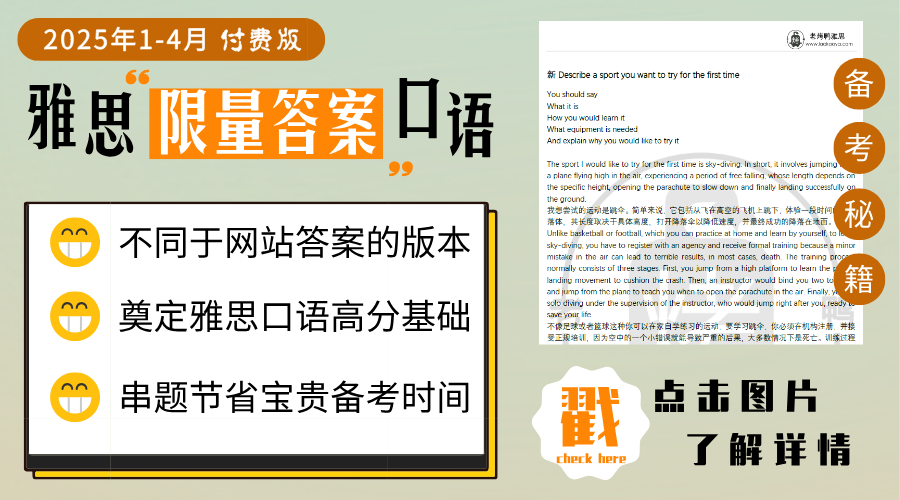students or governments pay their college or university fees 雅思写作教育类8分范文
这篇雅思写作大作文要求大家探讨政府支付大学学费的优劣。这一方案的好处在于,可以鼓励穷人接受高等教育,缩减社会差距;培养高质量的劳动力,有助于国家经济的发展;但其害处也很明显,一方面这会占用本可以用于其他领域的预算;另一方面它也可能导致一些想要混日子的学生进入学校。
雅思写作教育类题目
In some countries, students pay their college or university fees, while in some others, government pays for them. Do you think the advantages that government pays the money outweigh the disadvantages?
在一些国家,学生自己付学费,而在其他国家,政府则承担相应费用。你认为政府付学费的优势是否大于其劣势?
雅思写作教育类范文
开头段
It is true that the government bears the cost of tertiary education in some countries. Although this is advantageous for some underprivileged students, I believe the drawbacks certainly outweigh the benefits.
一些国家中,确实由政府来承担高等教育的费用。虽然这对于一些贫困学生来说十分有益,但我认为其缺陷大于好处。
政府承担学费可以促进公平
The main advantage of the government paying for college and university is that this creates equal opportunity for everyone and reduces the disparity between the poor and the rich. The poor are unable to afford college education because of a lack of family support and concerns about debts in the future. With government-paid university education, everyone can go to college and acquire a college degree without crushing debt on their shoulder. The career opportunities that come with a university education can get them out of the endless cycle of poverty.
政府支付大学学费的主要优势在于,为每个人创造平等的机会,并缩减贫富差距。贫困人群由于缺乏家庭支持和担心未来债务无力负担大学教育。有了政府提供的资金,任何人都可以上大学,获得大学文凭,而不必背上债务。伴随大学教育而来的职业发展机会能够将他们带出贫困的无尽循环。
政府承担学费会导致教学质量下降
However, the drawbacks of public-funded university education are far too many. One of the main drawbacks is that the quality of education goes down. When more people go to college, the campuses get overcrowded, making the classes larger and reducing teacher attention to students. Also, the value of education comes down. Universities become full of non-serious students, just whiling away their time and the number of dropouts also increases. If students know that their parent’s hard-earned money is going into their higher education or if they have monstrous student debts, they would not relax and study seriously.
然而,这一方案的缺陷实在太多。主要的缺点在于,教育质量会下降。当更多的人进入学校,校园会变得过于拥挤,课堂规模会变大,并降低老师对学生的关注度。此外,教育的价值也会下降。大学会充满只为打发时间,不认真的学生,而辍学的数量也会上升。如果学生知道他们父母努力赚来的钱被用于他们的高等教育,或者他们背上巨额债务,那么他们就不会放松,而是努力学习。
政府承担学费存在机会成本
Another drawback of government paying the fee is the lost opportunity cost. In other words, tertiary education is very expensive and if the government pays college fees for everyone, it’s going to be left with little resources to spend on other important sectors like healthcare and infrastructure. The government can offer loans or scholarships for poor students, but completely funding higher education would come at cost of development in other areas.
另外一项政府付款的缺陷在于损失的机会成本。换句话,高等教育十分昂贵,如果政府为每个人支付学费,它用于其他部门(如医疗和基础设施)的资源就会减少。政府可以为贫困学生提供贷款或者奖学金,但完全为高等教育出资将会以其他领域的发展为代价。
结论
In conclusion, I would like to reiterate that though government-paid college education benefits the poor, the disadvantages are far too many to be ignored.
总的来说,我想重申,虽然政府负担的大学教育对穷人有利,但其缺陷太多,不容忽视。
点击查看其他雅思写作历年真题范文


